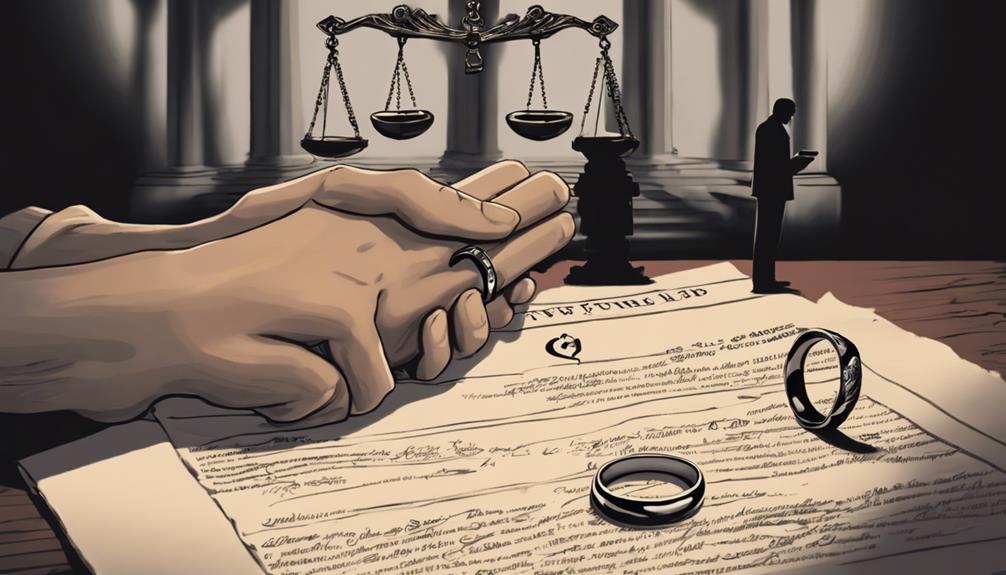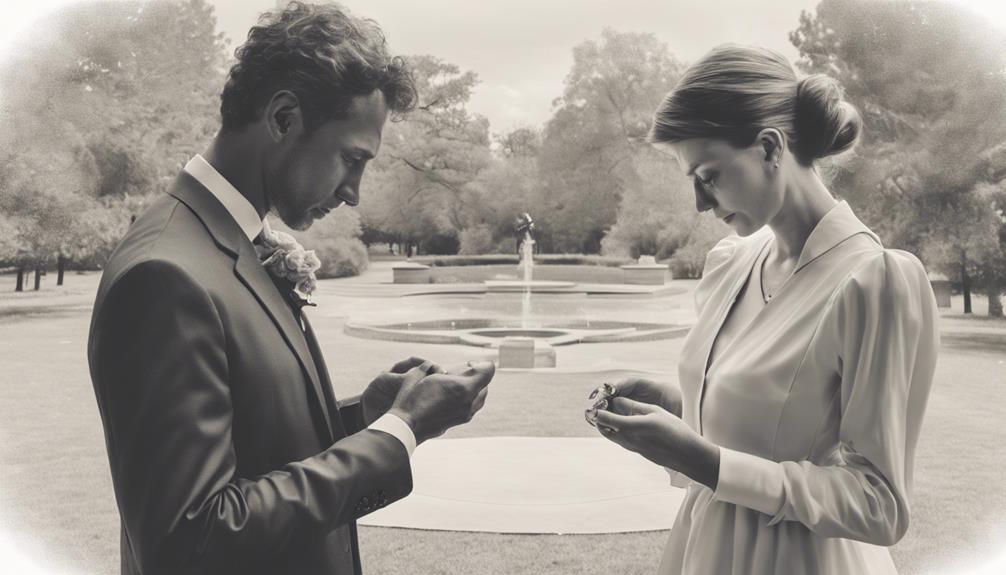You can get engaged before your divorce is final, but it’s not without challenges. Legally, it doesn’t change your marital status, but emotionally, it can stir up trouble, especially with an ex-spouse or children. Courts might also weigh new relationships during custody and financial support discussions. Engaging too soon can seem disrespectful, complicating current proceedings. It’s wise to resolve your divorce first to avoid unnecessary complications and gain clarity in your new relationship. There’s more you can discover about steering through these tricky waters.
Legal Implications of Early Engagement

Although it’s legally permissible to get engaged before your divorce is finalized, doing so doesn’t alter your current marital status or grant you any new legal rights. When you’re engaged while still married, your divorce isn’t final, meaning you’re still seen as married in the eyes of the law. This can complicate several aspects of your divorce proceedings.
For instance, publicly announcing your engagement while still married might provoke emotional reactions from your ex-spouse. This could lead to disputes that delay the finalization of your divorce.
Additionally, courts may take your new relationship into account when evaluating custody arrangements, as they prioritize the child’s welfare and may view the new relationship as a stability factor.
Entering into a new relationship can also introduce complications regarding property division and spousal support negotiations. Your ex-spouse could argue that your new partner’s financial situation should be considered, potentially impacting your settlements.
As a result, it’s essential to seek legal advice before getting engaged during this shifting period. Consulting with a divorce attorney can help you navigate these potential legal and emotional ramifications effectively.
Additionally, consider discussing a prenuptial agreement with your new partner to protect both parties’ interests.
Emotional Repercussions and Etiquette
Engaging before your divorce is finalized can stir a whirlwind of emotions, impacting everyone involved. You might feel excited about the new chapter, but your ex-spouse and family could react differently. This decision can complicate family dynamics, especially if children are involved. They may experience confusion and distress, affecting their emotional well-being. It’s essential to reflect on how your actions will impact them.
From an etiquette perspective, getting engaged before your divorce is finalized is often seen as poor form. It can provoke unnecessary inquiries and feelings among family and friends, leading to awkward conversations and misunderstandings. Publicly announcing an engagement during this period can also create additional pressure and misinterpretations about your intentions.
Your focus should be on resolving the divorce first. This shows respect for all parties involved and helps avoid further complications. Prioritizing the finalization of your divorce will provide a clearer path for your new relationship, ensuring that everyone’s emotional well-being is taken into account.
Impact on Divorce Proceedings

When you decide to get engaged before your divorce is final, you risk complicating the divorce proceedings in several ways. Since you’re still legally married, your new engagement can introduce emotional and legal complexities.
In family law, courts may see your new relationship as a sign of instability, which can influence custody arrangements. This is particularly significant if the court is evaluating the child’s best interests.
Financial implications are another concern. If your new partner has substantial income, it might affect decisions on spousal support or property division. Transparency with your legal counsel becomes vital, as they need to understand all factors that could impact your case.
If you’re planning a wedding before your divorce is finalized, this could also be seen as a rush to move on, potentially affecting the court’s view on your current legal status.
Additionally, introducing your new fiancé to your children can violate court-issued Standing Orders, further complicating custody evaluations. Courts prioritize stability for children, and a new engagement might be seen as disruptive.
Considerations for Children
While the complications of getting engaged before your divorce is finalized can impact the legal proceedings, the potential effects on your children are just as significant.
Children can experience confusion, struggling to understand the dynamics of their parents’ relationships during this shifting period. Your engagement might make them feel neglected or unsettled, especially if it seems to take precedence over their emotional needs.
To mitigate these challenges, open communication with your children is vital. Discuss your engagement in an age-appropriate manner and reassure them of their place in your life. This transparency helps them process their feelings and guarantees they feel supported during this major change.
Professional counseling can be incredibly beneficial in such scenarios. Children often find it easier to express their concerns and adjust to new family structures with the guidance of a counselor. This step acknowledges their emotional turmoil and shows your commitment to their well-being.
Above all, prioritize stability in their lives. While the law allows you to get engaged before your divorce is final, it’s important to focus on maintaining a stable environment for your children.
Balancing new relationships with their needs guarantees a smoother shift for everyone involved.
Financial and Legal Considerations

Entering into an engagement before your divorce is final can bring a host of financial and legal factors that you need to navigate carefully. While you’re legally permitted to get engaged to be married, it doesn’t change your marital status or alter the divorce proceedings.
However, announcing your engagement could complicate matters, especially if you have joint accounts or shared assets. These financial implications might make the division of property more complex, leading to prolonged negotiations.
Publicly declaring an engagement can also provoke emotional reactions from your ex-spouse, potentially delaying the finalization of your divorce. Courts might scrutinize your new relationship, particularly in custody evaluations, to determine if it introduces instability into your children’s lives.
This is why it’s essential to evaluate the timing of your engagement and its potential impact. To mitigate these risks, it’s advisable to draft a prenuptial agreement for your new relationship and address any financial entanglements from your previous marriage.
Seeking a consultation today with a divorce lawyer can provide clarity on how to proceed without jeopardizing your legal and financial standing. This proactive approach guarantees you meet all your responsibilities while planning your future.
Conclusion
In summary, while you can get engaged before your divorce is final, it’s crucial to be mindful of the potential complications. Early engagement can heighten emotions, add tension to your divorce proceedings, and affect your children. To guarantee a smooth changeover and a strong foundation for your new relationship, it’s wise to finalize your divorce first. Taking this step demonstrates respect for the process and helps pave the way for a healthier future commitment.



